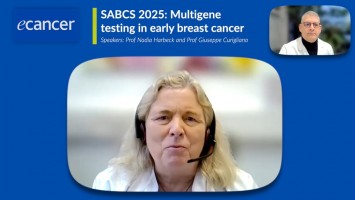What we’ve done is, in fact, we’ve put together a lot of different tests. We had the idea that what we really needed in order to answer the problems that we’ve got in terms of screening for cancers, where we can really only screen for the common cancers and actually not that many of those, was a generic cancer test. We needed something that would allow us to look for cancer generically within the blood. We know that cancers have quite a wide repertoire of things that they do that appear within the blood. So there are changes within cancer that produce biomarkers and there are changes in the host in response to the cancer that produce biomarkers and together all of these changes occur in the blood. What we don’t know is which ones appear earliest so one of the things we’ve got to do is go and find out which ones appear at the earliest time. To start the ball rolling we did a literature search and the literature search is what we’ve actually presented here at the NCRI. That literature search has of the order of 20,000 papers and we’ve identified about 800 biomarkers. Of those 800 biomarkers the likelihood is that many of them look at the changes that we’re describing, or have been described, within cancers that appear in the blood. So if we can identify the biomarkers that are of most relevance and that could be used within standard pathology labs then we can put together a series of biomarkers, starting with ones that have high sensitivity and low specificity, that then go on to obtain greater specificity as you reflex test further biomarkers from the same sample. So the patient would only have one blood test, at the end of that we would be able to take that single blood test result and decide whether the patient needed to come back to see the hospital, see the GP, perhaps have a further test and that would be the way that you would detect the patients with cancer for further investigation.
How does it work?
So the idea is that we have a series of tests that occur first that tell us whether the patient is at serious risk of having a cancer or not. Then we have a further series of tests done on the same sample that tell us whether the patient is at serious risk of having a cancer and if they are then clearly they need to be investigated further and that may involve radiology or gastroenterology or other investigations.
When will we see this in use?
I think it will be a few years. We have the ability now to take the test that we know about and to start putting those into the laboratory. We have to do a lot of testing of the tests to make sure that they can really do what we think they can do and that will probably take us another 3-4 years. At that point we’ll be ready to go into a large clinical trial. We need to do that because we have to obtain the data to say that the screening is safe and effective and that it is able to produce results which are cost effective for the NHS. Then we’ve got to put it all together and present it to the National Screening Committee and that will take us a few years to do.
What about over-treatment?
In every screening system, in every screening programme, there is potential for over-treatment and we need to ensure that patients are not unnecessarily investigated and that we don’t over-treat as a result. So it’s very important indeed that we ensure that what we’re doing is safe and cost-effective. Something like 20% of those that die from cancer die of rare cancers, those that are outside the top ten, and those there will never be a screening test for because you couldn’t do it cost effectively for those single cancers. So this gives us an option to try to meet the need that exists for patients who have rare tumours. There are about 330,000 cancers each year in the UK and about 25% of those have an emergency presentation. So we’re actually allowing patients to have serious symptoms before they are detected with having a cancer. If we can try to get them to the point where the cancer is detected before they even know they’ve got one, the chances are it will be small enough to treat without the treatment causing them any undue difficulty.
In what age range do you see this happening?
We think actually it will be risk adjusted so we think we’ll be looking at risk adjusted screening. The risk adjusted screening would take into account familial factors, lifestyle factors – their alcohol intake, obesity is linked with cancer as well – so all these factors are very easy to measure and very easy to put into an algorithm that you can then use to decide who needs screening and when they need screening. So it may be that some people will need screening from quite an early age where others may not need screening until well into their 50s or 60s.
A patient could give their GP details on their lifestyle and the system could inform the GP which tests they need?
Yes, possibly. I think there will be more to it than that. Within about three years we’re expecting to have the results of Genomics England’s 100,000 Genome project and that is likely to produce some fairly sophisticated risk factor screening tools that will enable us to determine who might have a problem.








